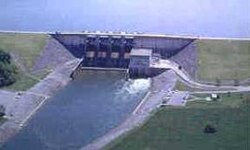J. Percy Priest Dam: Difference between revisions
No edit summary |
mNo edit summary |
||
| Line 17: | Line 17: | ||
504.50ft The dam can hold flood waters up to this level before cresting<p> |
504.50ft The dam can hold flood waters up to this level before cresting<p> |
||
494.50ft Elm Hill Marina begins to flood by surpassing the individual walkways to the boat docks<p> |
494.50ft Elm Hill Marina begins to flood by surpassing the individual walkways to the boat docks<p> |
||
494.50ft Hamilton Creek Sailboat |
494.50ft Hamilton Creek Sailboat Marina begins to flood by surpassing the primary walkway to the sailboat docks<p> |
||
490.00ft Summer Pool (April to October)<p> |
490.00ft Summer Pool (April to October)<p> |
||
483.00ft Winter Pool (November to March)<p> |
483.00ft Winter Pool (November to March)<p> |
||
Revision as of 15:57, 16 May 2011



J. Percy Priest Dam is a dam in north central Tennessee at mile 6.8 of the Stones River, a tributary of the Cumberland. It is located about ten miles east of downtown Nashville. The reservoir behind the dam is Percy Priest Lake.
The Flood Control Act of 1946 commissioned the construction of a project under the name “Stewarts Ferry Reservoir”. Public Law 85-496, approved July 2, 1958, changed the name to J. Percy Priest in honor of the late Congressman from Tennessee.[1] Construction began June 2, 1963 and the dam was completed in 1968. The dam was built under U.S. Army Corps of Engineers supervision.
Rising 130 feet (40 m) above the streambed, the combination earth and concrete-gravity dam is 2,716 feet (828 m) long with a hydroelectric power plant generating 28 MW of electrical power. The dam has contributed significantly in reducing the frequency and severity of flooding in the Cumberland Valley. In addition to the far-reaching effects of flood control, the project contributes to the available electric power supply of the area.
The dam is easily visible from Interstate 40 where it crosses the Stones River.
Reservoir Elevation (behind the dam)
(elevations are in feet above sea level)
504.50ft The dam can hold flood waters up to this level before cresting
494.50ft Elm Hill Marina begins to flood by surpassing the individual walkways to the boat docks
494.50ft Hamilton Creek Sailboat Marina begins to flood by surpassing the primary walkway to the sailboat docks
490.00ft Summer Pool (April to October)
483.00ft Winter Pool (November to March)
480.00ft Permanent Pool
Tailwater Elevation (below the dam)
Current Evevations and Hourly Discharge information can be found at: www.tva.gov/lakes/jph_o.htm
Hourly Discharge
The Tennessee Valley Authority (TVA) reports all discharge information online viewable to the public.
Current Evevations and Hourly Discharge information can be found at: www.tva.gov/lakes/jph_o.htm
It has been found that if J Percy Priest dam is discharging 6500-9000 Cu/Ft. Per Min resulting in
390,000-540,000 Cu/Ft. Per Hour it takes nearly 22-28 hours for the resivor elevation to receed 1ft.
References
- ^ Dates in Nashville District History, U.S. Army Corps of Engineers Nashville District website, accessed August 11, 2009
External links
- Priest Dam project changed lives of many - The Tennessean
- View Weather & Maps - Unearthed Outdoors
- www.tva.gov/lakes/jph_o.htm
36°09′25″N 86°37′05″W / 36.156878°N 86.618056°W
![]() This article incorporates public domain material from the United States Army Corps of Engineers
This article incorporates public domain material from the United States Army Corps of Engineers
